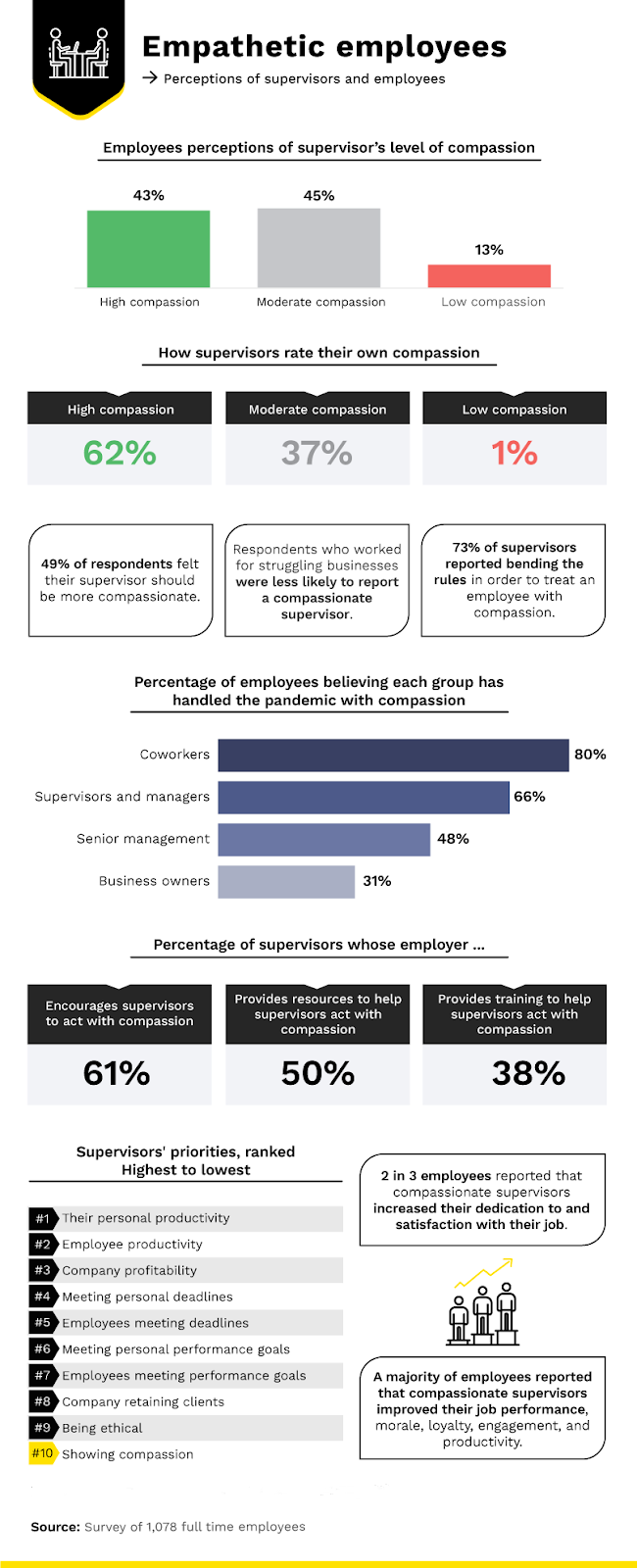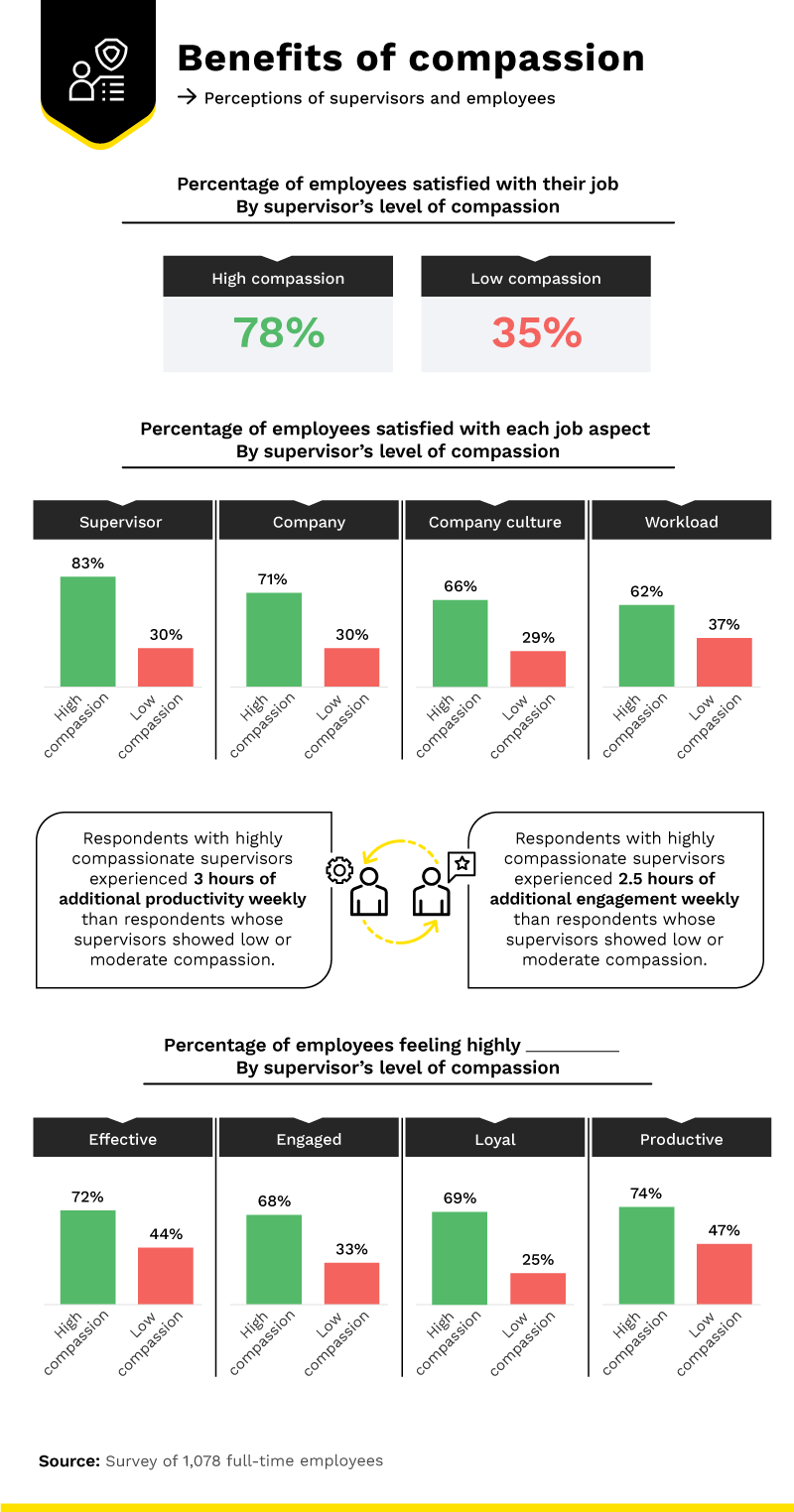Compassion at work: Exploring perception and impacts of workplace compassion

Ever heard the saying “it’s not personal, it’s business”? Well, sometimes, it is personal. Now that our living rooms have been transformed into virtual meeting rooms and the line between home and office has been more or less erased, tapping into our emotional intelligence at work is more important than ever.
With COVID-19 and its many associated worries continuously looming over our heads, compassionate leadership is also becoming a must instead of a bonus. Employees need an increased amount of reassurance, flexibility, and kindness in their day to day, and employers must be patient while navigating a massive wave of adaptation.
Compassion at work is about noticing, feeling, and acting to relieve the pain of the people we work with.
To understand whether employees feel like their superiors have acted with compassion during the pandemic and to compare those sentiments with how managers perceive their own actions, we surveyed 270 supervisors and 808 full-time employees from Australia, the United Kingdom, and the United States. Here’s what we found.
Calculating Compassion
How much compassion does the average supervisor have toward their employees? The answer might depend on whom you ask.

The quality of upper management plays a significant role in overall employee happiness. When managers and subordinates have a poor relationship, productivity declines, stress levels spike, and motivation to succeed takes a nosedive. On the flip-side, two-thirds of our surveyed population said that having a compassionate boss increased their dedication to and satisfaction with their job, as well as their morale, loyalty, engagement, and more.
Luckily for our respondents, managerial compassion levels were generally quite high: 43% ranked their manager as having high compassion, and another 45% said they were moderately compassionate. The remaining 13% were stuck with a low-compassion boss.
When asked to evaluate themselves, though, about a third of supervisors tended to overestimate their abilities: 62% viewed themselves as high-compassion superiors, and 37% thought they expressed moderate levels of compassion. That left just 1% who self-identified as a low-compassion boss. To be fair, 73% of supervisors did say they had bent the rules to treat an employee with compassion.
During the pandemic, respondents reported feeling the highest levels of compassion from fellow employees (80%), as opposed to supervisors (66%), senior management (48%), or business owners (31%). While supervisors ranked “showing compassion” as their number one priority – above items like retaining clients, meeting deadlines, and upholding ethics – these responses revealed that there may still be more work to be done.
Beyond helping out somebody who's suffering, the academic research suggests that expressing compassion strengthens your relationship with other people and makes them want to follow you as a leader. Indeed, when it comes to being perceived as a leader, it is more important that you are compassionate than that you are smart.
Passion and compassion
How much compassion have supervisors shown their employees during the pandemic, and how does their support affect people’s drive to succeed?

Some bosses worry that "being soft" will give their direct reports license to slack off and not deliver on performance expectations.
According to our survey, the proof is in the pudding: 78% of respondents with high-compassion bosses said they were happy at their job, compared to just 35% with low-compassion bosses.
On a more granular level, employees who received compassionate treatment from higher-ups were more than twice as satisfied with their supervisors, the company, their workload, and the company culture. That same group also contributed, on average, three hours of extra productivity and 2.5 hours of extra engagement every week.
Clearly, employees are willing to give more of themselves to bosses that treat them with compassion and respect. In fact, employees with compassionate managers were far more likely to feel highly effective, highly engaged, highly loyal, and highly productive.
Dream boss, dream job: it all starts with your education
The grand majority of respondents were satisfied with the amount of compassion they’re receiving from their superiors as the pandemic continues to grip the world. Our survey also revealed an extremely strong link between compassionate management and employee performance: People who worked under empathetic superiors were more motivated, engaged, productive, and satisfied with their jobs overall.
To land your dream career with a company that shares your values, you’ll need a top-tier education. UNSW’s 100% online Master of Management program is delivered by the highly awarded Australian Graduate School of Management (AGSM) and is designed to provide students with critical business acumen to lead and innovate teams in an accelerating business world. To learn more about our Management program, explore our postgraduate degree offerings today.
Methodology and Limitations
We surveyed 1,078 full-time employees using Amazon MTurk and Prolific. Respondents were residents of Australia, the United Kingdom, and the United States. 270 respondents held a supervisory or managerial position, while 808 respondents did not.
To help ensure accurate responses, all respondents were required to identify and accurately answer an attention-check question. In some cases, questions and answers have been paraphrased or rephrased for clarity or brevity. These data rely on self-reporting, and potential issues with self-reported data include telescoping, selective memory, and attribution errors.
Fair Use Statement
Got some kindness to spare? We have two simple requests: Please only share for noncommercial purposes and always link back to this original article whenever you share our info with a colleague, friend, or family member. That way, credit is given where it’s due. Thank you!









